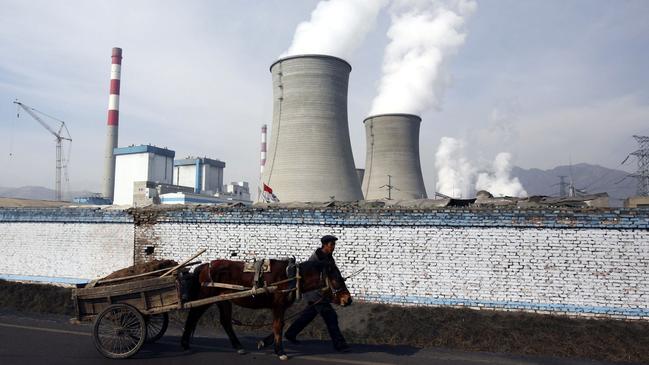China moving ‘too slow’ on renewables
China needs to radically increase its share of renewable energy to offset the dominance of coal in the nation’s power mix.

China needs to radically increase its share of renewable energy to offset the dominance of coal in the nation’s power mix amid concern the world’s most polluting country is moving too slowly in tackling climate change.
The economic powerhouse has promised its carbon emissions will peak by 2030 in line with a commitment to the Paris climate agreement, but critics say China is still more focused on economic growth at the expense of global warming.
“I think most people agree climate change is one of the gravest problems we face but a very big problem here is that we do not really rate it as an urgent issue to address,” said Lin Boqiang, director of the China Institute for Studies in Energy Policy at Xiamen University, at the UBS Greater China Conference in Shanghai on Tuesday. “We feel the urgency.
“The public are talking about it but in reality they still prioritise economic growth.”
Coal still dominates China’s energy mix with about 59 per cent of generation, with renewables including nuclear and biomass accounting for just 6 per cent of supply, according to Mr Lin.
The country has failed to develop a strategy for moving away from coal given about 6000 coal-fired power plants still operate in the power grid. Adding to concern is that clean energy investment fell to just $US30bn ($43.5bn) in the first half of 2019 from over $US75bn for the same period two years earlier.
“The issue of changing the energy mix is quite difficult because renewables is simply too small,” said Mr Lin, who also acts as a member of the energy advisory committee of the World Economic Forum.
“Of course the key solution is to give full support to renewables and then if it can take up between 10 to 20 per cent of the grid you could see it replace coal very fast.
“But for now demand can’t be met, so you are not really seeing any substantial change in these sectors.”
The climate expert also questioned targets set for 2050 by China as being too distant and allowing an unjustified sense of comfort to seep into the debate within the country.
“The time span is far too wide to really be effective,” Mr Lin said. “After 10 years of efforts carbon emissions globally are still increasing, so we need a big change of thinking to really switch things around.”
Global coal demand grew by 1.1 per cent in 2018 and is expected to steadily increase over the next five years, driven by demand in India, China and Southeast Asia, according to the International Energy Agency.
Despite efforts to cut use of the polluting fuel to combat global warming, coal remains the world’s largest source of electricity, with 38 per cent of the global share. Power generation from coal rose by almost 2 per cent in 2018 to reach an all-time high.
China, responsible for half the world’s consumption, saw its consumption increase by 1 per cent last year but the IEA expects modest growth in the years ahead, with demand ultimately plateauing in 2022.
Over the last two decades coal demand has suffered dips, notably during the adoption of critical climate talks with the Kyoto Protocol in 1997 and the Paris agreement in 2015, with each resulting in multi-year declines.
However, the IEA said expectations of an imminent coal collapse have come and gone before and while the investment climate toward the fuel has changed, it would not result in any sudden plunge in demand.
The IEA called for the rollout of carbon capture and storage technologies through Asia’s young power plants to bring the world into line with international goals on climate, air quality and energy access.
Mr Lin said the technology could form a part of the solution but it would take time to roll out.
The author travelled to Shanghai as a guest of UBS.



